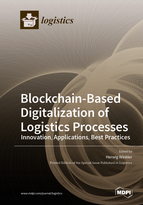Blockchain-Based Digitalization of Logistics Processes—Innovation, Applications, Best Practices
A special issue of Logistics (ISSN 2305-6290).
Deadline for manuscript submissions: closed (30 June 2022) | Viewed by 102054
Special Issue Editor
Interests: blockchain; flexibility; robustness; digitization; factory planning; production planning and controlling; supply chain management; simulation
Special Issues, Collections and Topics in MDPI journals
Special Issue Information
Dear Colleagues,
Blockchain technology is becoming one of the most powerful future technologies in supporting logistics processes and applications. It has the potential to destroy and reorganize traditional logistics structures. Both researchers and practitioners all over the world continuously report about new blockchain-based projects, possibilities, and innovative solutions with better logistic service levels and lower costs.
This Special Issue will collect and publish well-prepared research reports about the recent advances of blockchain technology in logistics processes to provide insights into the realized maturity. All kinds of articles—literature-based, empirical research, case studies—are welcome that cope with innovations, applications, and best practice examples of blockchain-based digitalization of logistics processes.
Authors from all disciplines are cordially invited to submit their papers until 30/6/2022. Exemplary topics could deal with blockchain technology in the following:
- Procurement and purchasing
- Intralogistics
- Logistics networks,
- Logistics platforms
- Maritime logistics
- Automotive logistics
Prof. Dr. Herwig Winkler
Guest Editor
Manuscript Submission Information
Manuscripts should be submitted online at www.mdpi.com by registering and logging in to this website. Once you are registered, click here to go to the submission form. Manuscripts can be submitted until the deadline. All submissions that pass pre-check are peer-reviewed. Accepted papers will be published continuously in the journal (as soon as accepted) and will be listed together on the special issue website. Research articles, review articles as well as short communications are invited. For planned papers, a title and short abstract (about 100 words) can be sent to the Editorial Office for announcement on this website.
Submitted manuscripts should not have been published previously, nor be under consideration for publication elsewhere (except conference proceedings papers). All manuscripts are thoroughly refereed through a single-blind peer-review process. A guide for authors and other relevant information for submission of manuscripts is available on the Instructions for Authors page. Logistics is an international peer-reviewed open access quarterly journal published by MDPI.
Please visit the Instructions for Authors page before submitting a manuscript. The Article Processing Charge (APC) for publication in this open access journal is 1400 CHF (Swiss Francs). Submitted papers should be well formatted and use good English. Authors may use MDPI's English editing service prior to publication or during author revisions.
Keywords
- Logistics processes
- blockchain
- innovation
- applications
- best practice
- industry solutions






